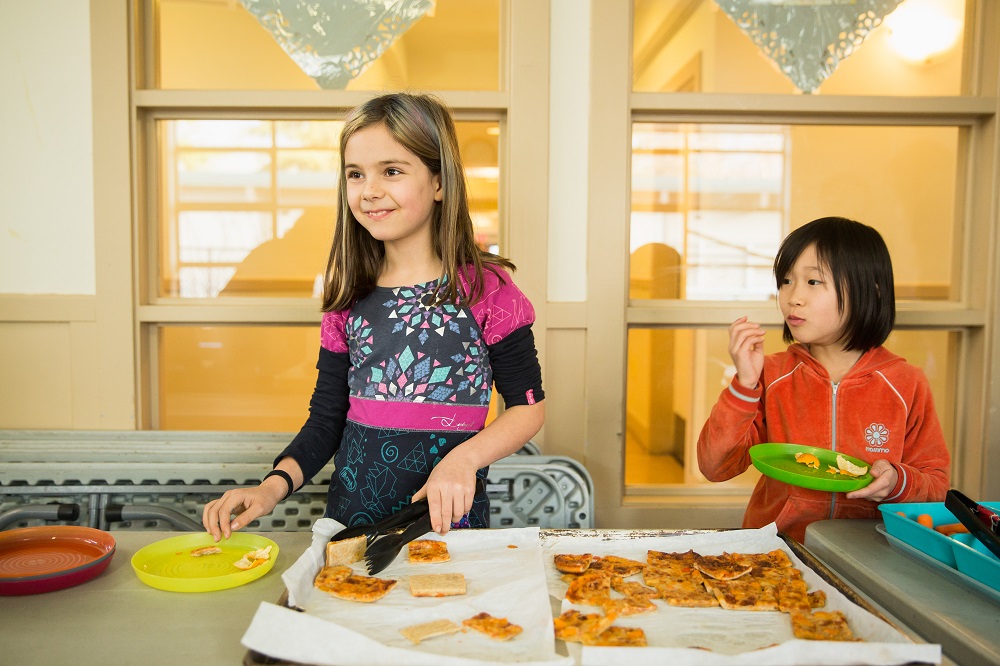Housing, hydro, healthy food: it seems like the cost of everything is skyrocketing in the Lower Mainland. And when budgets are tight, people often forgo fresh produce and protein, choosing instead cheap, unhealthy food. According to a report conducted by the BC Provincial Health Services Authority , over one in 10 BC households are ‘food insecure’; families unable to afford nutritious and safe food. The situation is worse for vulnerable people—refugees and single parents, for example—who face barriers such as lack of awareness of community resources, language and cultural differences, and even uncertainty around how to make a healthy meal.

Shaelyn knows this all too well. Six years ago, she found herself hungry and nearly homeless, with a newborn baby, when she moved into Aunt Leah’s Place, an organization that provides housing and support for young mothers. While living at Aunt Leah’s, one of the most valuable things Shaelyn learned was how to cook. When she moved out on her own, she continued attending workshops at Aunt Leah’s and was always sent home with bags of nutritious groceries to feed her two young sons.
“Aunt Leah’s food program gave me the support I need to get back on my feet,” says Shaelyn, who now works as an administrative coordinator for the Federation of BC Youth Care Networks. “I always had high aspirations of giving back to the community and I just need a little bit of support at that time to alleviate some costs and take some of the burden off so I could reach where I was heading.”
Today, Shaelyn can cook a full turkey dinner and enjoys getting creative in the kitchen with her growing boys, now five and six. “When I was younger, I always feared that I would never know how to cook for myself,” she says. “My kids are going to grow up with healthy habits and I’m hoping that they’ll pass those on to the next generation.”
Aunt Leah’s Life Skills, Food Security and Health program is one of more than 20 initiatives funded by the United Way of the Lower Mainland through Food for All grants. These programs do more than just fill bellies, they also educate participants about healthy eating, build community and help people access other valuable social services and resources, such as affordable childcare and housing.
“By giving to United Way, you do more than just help people access food, you help change the system at the neighbourhood level and at the provincial level,” says Yves Trudel, community impact planner with the United Way of the Lower Mainland. “You go beyond just making sure people are food secure for a short period of time, you help improve our whole society’s response to this.”
For people working on the frontlines, the programs funded by the United Way are critically important. When the children pour into Kiwassa Neighbourhood House for afterschool programs, they’re often drained, says children’s program coordinator Sarah Kamdar. But after having a healthy snack, they perk up and enjoy their activities. “The importance of food can’t be highlighted enough in my opinion, especially for children in the middle years,” says Kamdar. “You see restlessness, anger, fatigue and physical aches, such as headaches and stomachaches, due to the lack of healthy food.”
Kiwassa serves Vancouver’s Hastings-Sunrise neighbourhood, where one in three children live in poverty, according to the 2014 census data. Without food programs, some children might not be eating. “Children have a right to an education, they have a right to play, they have the right to be safe and they also have the right to eat good, healthy food,” says Kamdar. “I think food underpins all of that. Without access to healthy food, they can’t excel in their education, they can’t excel in play, and it also puts them in a vulnerable state.”
Thanks in part to support from the United Way, the number of vulnerable children in Hastings-Sunrise has been reduced. In 2011, 48 percent of children were vulnerable in one or more of the five core areas of early child development measured by the Early Development Instrument. That number was reduced to 37 percent in 2016.
Last year, 1.5 million meals or snacks were served to kids, families and seniors through United Way community service providers. Every Thursday night in Vancouver’s West End, people from the LGBTQ community get together for the Rainbow Soup Social at Gordon Neighbourhood House and cook up vats of tasty vegan soup to serve to their fellow community members the next day.
“We know that people in the LGBTQ and two-spirited community face more barriers to food access, predominately because a lot of the spaces in the community where there is access to food may not feel safe,” says Chantille Viaud, director of community food initiatives at Gordon Neighbourhood House. “People really enjoy being able to get together in a safe space.”
The volunteers usually whip up between 250 to 300 bowls of soup, which are enjoyed in the community food hub, where people can also access the food bank. Viaud says the social aspect of sitting down for a meal with neighbours helps alleviate the anxiety of accessing the food bank.
“Food evokes really powerful emotions and has this power to bring people together,” says Viaud. “I think in a city where people are facing social isolation, creating spaces for these connections to happen is really important and prevents a lot of the other health issues. It’s a way for people to get to know each other, have their voice heard and feel connected to their community.”






